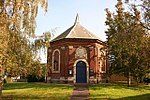South Holland and The Deepings (UK Parliament constituency)

South Holland and The Deepings is a constituency in Lincolnshire represented in the House of Commons of the UK Parliament since its 1997 creation by John Hayes, a Conservative. At the 2017 general election, the constituency recorded a higher Conservative share of the vote than any constituency since 1970, with 69.9% of voters backing the party. South Holland also delivered the second-highest "Leave" vote in the 2016 referendum on the UK's membership of the European Union (EU). 73.6% of voters endorsed the UK's withdrawal from the EU, second only to neighbouring Boston. At the 2019 general election, the Conservative majority was 62.7%, the highest of any Conservative in any constituency in any general election since Kensington South in 1955. Hayes took 75.9% of the vote, the third highest for the Conservatives only after Castle Point in Essex and Boston and Skegness.
Excerpt from the Wikipedia article South Holland and The Deepings (UK Parliament constituency) (License: CC BY-SA 3.0, Authors, Images).South Holland and The Deepings (UK Parliament constituency)
Delgate Bank, South Holland
Geographical coordinates (GPS) Address Nearby Places Show on map
Geographical coordinates (GPS)
| Latitude | Longitude |
|---|---|
| N 52.75 ° | E -0.1 ° |
Address
Delgate Bank
Delgate Bank
PE12 6DH South Holland
England, United Kingdom
Open on Google Maps









